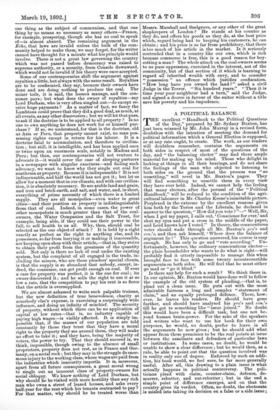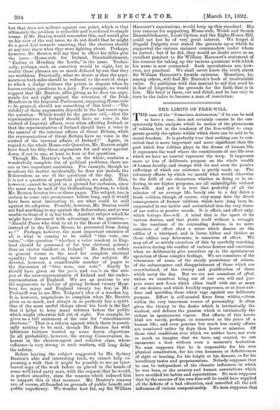A POLITICAL BALANCE. T HE excellent "Handbook to the Political Questions
of the Day," prepared by Mr. Sydney Buxton, has just been reissued by Mr. John Murray in a revised form, doubtless with the intention of meeting the demand for political information which a General Election is supposed, or at any rate ought, to create. The work, as our readers will doubtless remember, contains the arguments on both sides in respect of most of the questions of the day, and "the balancing elector" may find there ample material for making up his mind. Those who delight in looking at things in all their bearings, and do not share the feelings of the man who objected to listening to both sides on the ground that the process was "so unsettling," will revel in Mr. Buxton's pages. They will find something to unsettle them in every view they have ever held. Indeed, we cannot help the feeling that many electors, after the perusal of the "Political Handbook," will be reduced to the condition of the agri- cultural labourer in Mr. Charles Keene's inimitable picture. Perplexed in the extreme by the excellent reasons given him both by the Tories and the Liberals, he declared in answer to the question, " How did you vote ?"—" Well, Sir, when I got my paper, I calls out, Conscience for ever,' and shut my eyes and put a cross in the middle of the paper, and Lord knows how I voted." In theory, the conscientious voter should wade through all Mr. Buxton's pro's and. con.'s, and then ask himself, Where does the balance of argument lie ? ' This question answered, his course is easy enough. He has only to go and "vote according." Un- fortunately, however, the ordinary conscientious elector— the plain householder who wants to do what is right—will probably find it utterly impossible to manage this when brought face to face with some twenty incontrovertible arguments on both sides. He will feel that he must either go mad or "go it blind." Is there any help for such a result ? We think there is. In our opinion, Mr. Buxton would have done well to follow the example of the old system of pleading,—that is, to plead out a clean issue. He puts out with the most admirable fairness a long and complex "statement of claim," and an equally prolonged defence. There, how- ever, he leaves his readers. He should have gone further, and should have analysed his pro's and con.'s till he got to something like "issue joined." No doubt this would have been a difficult task, but one not be- yond human brain-power. For the sake of the speakers and writers who want to use his book for their own purposes, he would, no doubt, prefer to leave in all the arguments he now gives ; but he should add what appear from these premisses to be the real points at issue between the assailants and defenders of particular laws or institutions. In some cases, no doubt, he would be unable to show a. clear difference ; but he would then, as a. rule, be able to point out that the question involved was in reality only one of degree. Enforced by such an addi- tion, his book would, we feel sure, be far more generally useful. After all, this drawing to a plain issue is what actually happens in political controversy. The poli- ticians plead with claim, counter-claim, defence, de- murrer, rebutter, and sur-rebutter ; but in the end a simple point of difference emerges, and on that the country gives its verdict. Often, no doubt, the electorate is misled into taking its decision on a false or a side issue ; but that does not militate against our point, which is that ultimately the problem is reducible and is reduced to simple terms. If Mr. Buxton would remember this, and would give us his view of the real issue, we do not doubt that he might do a good deal towards ensuring that the electors should at any rate know what they were fighting about. Perhaps, however, Mr. Buxton will say that in effect his titles give the issue,—Home-rule for Ireland, Disestablishment, "Ending or Mending the Lords," is the issue. Techni- cally, perhaps, such an assertion would be right, but in reality these phrases are BO much defaced by use that they are worthless. Practically, what we desire is that the argu- ments on both sides should be reduced to the sort of shape to which a Judge reduces the points in dispute when he leaves certain questions to a jury. For example, we would suggest that Mr. Buxton, after giving as he does ten argu- ments for and eight against the retention of the Irish Members in the Imperial Parliament, supposing Home-rule to be granted, should say something of this kind :—‘ The validity of these arguments depends in the last resort upon the question : Which would be the greater evil,—that the representatives of Ireland should have no voice in the control of Imperial affairs, even when affecting Ireland, or that the representatives of Ireland should have a voice in the control of the internal affairs of Great Britain, while the representatives of Great Britain have no voice in the control of the internal affairs of Ireland ?' Again, in regard to the whole Home-rule Question, Mr. Buxton might have fined his fifty-three arguments for and sixty against down, if not to one, at least to four or five questions.
Though Mr. Buxton's book, on the whole, contains a wonderfully complete list of political problems, there are one or two important omissions. For example, though he mentions the matter incidentally, he does not include the Referendum as one of the questions of the day. That it is not a question of practical politics, we admit. This, however, cannot be urged as a ground for exclusion, since the same may be said of the Gothenburg System, to which Mr. Buxton devotes two or three pages. The subject, too, is certain to come into prominence before long, and it would have been most interesting to see what could be said. against its adoption. Possibly, however, Mr. Buxton could not find anything to say against the Referendum, and so was unable to treat of it in his book. Another subject which he might have discussed with advantage is the question,— " Should Peers who wish to sit in the House of Commons, instead of in the Upper House, be prevented from doing so ?" Perhaps, however, the most important omission of all is what is coming to be called "One vote, one value,"—the question "whether a voter resident in Eng- land should be possessed of far less electoral potency than an elector resident in Ireland." Mr. Buxton refers in general terms to the need for complete electoral equality, but says nothing more on the subject. He devotes, however, a considerable number of pages to the discussion of "One man, one vote." Surely he should have given us the pro's and cwt.'s on the sub- ject of the over-representation of Ireland and the under- representation of England. We are as anxious to see the arguments in favour of giving Ireland. twenty Mem- bers too many and England twenty too few, as Mr. Pecksniff was to see Mrs. Todgers's idea of a wooden leg. It is, however, ungracious to complain when Mr. Buxton gives us so much, and always in so perfectly fair a spirit. One of the most useful things about his book is the fact that it helps to keep many reforms before the public which might otherwise fall out of sight. For example, he gives us a full statement of the case for "simultaneous elections." That is a reform against which there is practi- cally nothing to be said, though Mr. Buxton has with laborious fairness hunted up some dozen objections. In all probability, however, the strong Conservatism in- herent in the election-agent and solicitor class, whose influence is very strong in such matters, will long delay the reform.
Before leaving the subject suggested by Mr. Sydney. Buxton's able and interesting book, we cannot help ex- pressing a wish that it might be possible to see an inter- leaved copy of the work before us placed in the hands of some well-tried party man, with the request that he would, in perfect sincerity, state the reasons which induced him to support this or that measure. Mr. Buxton's reasons are, of course, all founded on grounds of public benefit and public expediency. We wonder how far, say Sir William Harcourt's annotations, would keep up this standard. His true reasons for supporting Home-rule, Welsh and Scotch Disestablishment, Local Option, and the Eight-Hours Bill, could not but be of very great interest. We forget if Dugald Dalgetty ever stated the grounds upon which he supported the various eminent commanders under whom he served ; but if he did, they would no doubt serve as an excellent pendant to Sir William Harcourt's statement of his reasons for taking up the various questions with which his name is now connected. Such speculations are, how- ever, not practical. We shall never know the truth about Sir William Harcourt's fireside opinions. Meantime, he, among others, will find Mr. Buxton's book of incalculable value. No politician with this manual to aid him need be in fear of forgetting the grounds for the faith that is in him. His brief is there, cut and dried, and he has only to turn to the index to become a man of conviction.



































 Previous page
Previous page